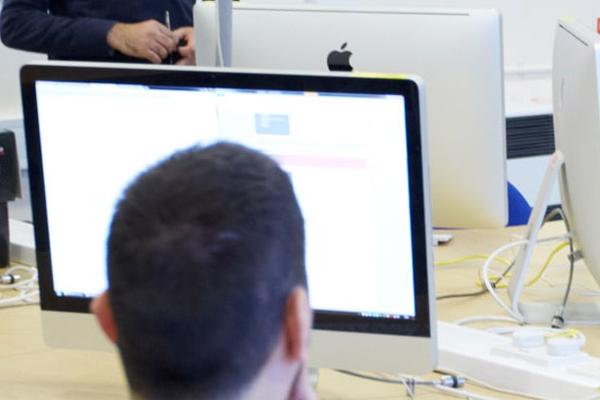
“Studying at Solent gave me the experiences which have became pivotal for my career. ”


Learn how to design, develop, and maintain software applications to create innovative technology solutions and enhance user experiences on this BCS-accredited degree.
In the first year of study you will cover a range of topics including coding, software testing, networking and security, algorithms and databases. You will also be supported to develop academic skills in writing and research, which will aid your learning throughout the course. These base-line topics will lead into more advanced areas of development in the second year, which include an introduction to artificial intelligence and mobile application development.
All of our undergraduate computing courses have an optional placement year between the second and third years of study, where you have the opportunity to work in industry, gaining valuable employment and experience.
The final year culminates in a major project where you will have the chance to showcase your skills and knowledge related to the engineering of software systems. You will also develop a deeper understanding of specialist areas through optional modules, which include popular areas such as data science and immersive technologies.
The supportive and experienced academic team will guide you in promoting yourself as a professional practitioner, through developing online profiles to showcase your skills and expertise. You will also be encouraged to engage in networking at local digital and technology events, helping you to gain invaluable real-world experience and feedback.
Our close links with industry will support you in gaining contacts, work experience opportunities, and insight into the software engineering industry. Industrial consulting is also enabled through a final year project unit which gets you industry ready to confidently go forward into the workplace.
As a graduate you will be able to pursue a wide range of career options in the digital industry, and will benefit from the continuing increasing industry demand for those with strong technical abilities in software development.
This course is part of the South Coast Institute of Technology (IoT), a partnership of colleges, universities and industry-leading employers to create new career opportunities in the technology sector. IoT courses like this one are precisely tailored to the needs of employers in the maritime, engineering and digital industries – industries which are hungry for talented new engineers, technologists, technicians and creatives like you.
Contact international admissions
Email: Call:Accredited by:

Part of:

This course has been accredited by a professional body
If you're not quite ready for a full undergraduate degree, there's alternative entry through one of our foundation years
You have the opportunity to obtain a professional membership as part of this degree
This course has access to specialist facilities
After successfully completing your studies, there's an opportunity to continue your studies at Solent
If you have an appropriate Level 5 qualification, you can top it up to a degree in just a year
You have the opportunity to study abroad in one of our partner universities for a semester on this course
This course is ideal for those with a passion for understanding and developing software systems, and who aspire for a career where they support, research, design, deploy and maintain software systems.
Graduates can enter a wide range of jobs including software engineering, software development, project management, IT support, web development and database management. The skills you’ll develop are highly valued by employers across a broad range of sectors.
Recent course graduates have gone on to various roles in the software industry including IBM, Si Digital, LeadStream, Fujitsu UK, Guernsey Post, Retail Manager Solutions Ltd.


Hear from Solent alumni about where their careers have taken them and how studying at Solent prepared them for their future.

“Studying at Solent gave me the experiences which have became pivotal for my career. ”

The University cannot guarantee any particular members of staff will teach specific aspects of the course in the future, but will endeavour to ensure the teaching team maintains their balance of experience and qualifications.
Students will develop apps for the web, desktop computers and a range of mobile platforms, and will be able to test them in our new device lab. This special test area is integrated within one of our existing software development spaces, and allows students to test out their web sites and apps on real equipment, including iOS and Android phones and tablets.
Students also learn to program robotic devices, including robotic arms and drones, and have access to up-to-date IT laboratories and a usability lab with eye-tracking facilities, used to test and refine interfaces. Learning is enabled by a range of industry standard equipment. Facilities include high-spec computer labs, device testing labs and a usability lab with eye tracking facilities. Students are also able to write programs for robotic devices and drones.
Broaden your horizons by adding an international dimension to your CV – essential to achieving success in today’s fast-changing, global environment.
Studying, working or volunteering in another country could be the experience of a lifetime. Enhance your degree by developing important global skills such as knowledge of other countries, language skills, intercultural awareness, adaptability and confidence.
For more information, please email international.mobility@solent.ac.uk.

This module will introduce you to software implementation through the process of understanding how to solve problems using programming.
In this module you’ll explore networks by using a network simulator to learn what devices and connections are used. These will then be applied to various principles of networking, protocols and associated technologies.
Through this module you will gain hands on experience applying a range of algorithms and data structures to problems. As well as creating your own algorithms, you will also be made aware of existing algorithms that are at your disposal and understand how they work.
In this module you are introduced to the skills and concepts required to develop and use relational databases. You will learn how to write programs interacting with databases and how to create them.
You will learn about the testing process and the different types of tests that are commonly used, these will include component/module testing, usability testing and user acceptance testing.
On this module you’ll be introduced to common client server-side scripting technologies used in the development of web applications, such as HTML, CSS, JavaScript, and PHP.
Solent’s curriculum framework builds on our unique, creative and applied approach to teaching. The transformation of students’ lives is at the heart of our mission as a university, and our curriculum – informed by the latest theory – reflects this shared educational vision.
Find out more
The student achievement team are on hand to help you succeed during your studies at Solent. They aim to contact you at key times during your time here with personalised information, advice and guidance, by email or phone.
The disability advice team provides information, advice and guidance for disabled students.
All students can access Succeed@Solent, Solent's online guide to getting better grades. It offers extensive, practical information and advice on topics such as academic writing, research and presentations.
Software engineering is among the top 30 most in-demand jobs in the UK in 2023, as well as being among the top highest paid graduate jobs.
The UK's IT services market is expected to achieve a revenue of $86bn in 2023, and is expected to maintain a steady growth rate of 6.26%. (Statista). The UK tech sector employs over 1.7 million people and adds over £150bn to the UK economy every year. (MOL)





Starting salary: £18,000
This is a typical graduate software engineer salary. The average annual salary for a software engineer is between £25,000 and £50,000.
Junior or entry-level: £20,000 to £25,000
Mid-level and senior web developers usually earn between £25,000 and £40,000. Specialising in newer or more sought-after technologies can lead to higher salaries.
The stated salaries are published on prospects.ac.uk.


Hear from Solent alumni about where their careers have taken them and how studying at Solent prepared them for their future.

“Studying at Solent gave me the experiences which have became pivotal for my career. ”

The Solent Careers team is committed to getting students into great careers.
While you are studying, the team can help you with finding work experience or placements, link you with a mentor, check your CV, or offer one-to-one guidance.
If you're in your final year, we also have graduate job opportunities just for Solent graduates.

6th
UK uni for sustained employment
Longitudinal Educational Outcomes, 2022
Accredited by:

Part of:


Thinking about studying further than an undergraduate degree? Alumni can get 20% off their postgraduate study.

Immerse yourself in the in-demand fields of AI and data science. Using problem-based approaches, your studies will equip you with the knowledge and skills to open doors to a wide range of careers.

Bring your problem-solving skills to both existing and emerging technologies on this highly practical, industry-led conversion course, ideal for students from non-computing backgrounds.

Gain the essential skills and knowledge to become a cyber security specialist, and learn to tackle cybercrime and manage security systems on this cyber security engineering master’s conversion degree.
The tuition fees for the 2025/26 academic year are:
For further information, please visit our tuition fees page.
While most course costs are covered by your tuition fees, some essential resources and optional extras may need to be paid for separately. For advice on budgeting and managing your money, please contact student.funding@solent.ac.uk.
Solent University offers a range of bursaries and scholarships that provide financial assistance or waive fees for tuition or accommodation. Each bursary or scholarship has specific eligibility criteria. Check out our bursaries and scholarships pages to find out more.
Solent EU Welcome Scholarship (Fee Discount)
This scholarship is available to students from an EU country, with EU nationality, who are applying for an undergraduate course starting in September 2025. The scholarship will reduce your tuition fees to £10,500.
Find out more about the scholarship
Cost of living support
At Solent, we understand that the cost of living crisis may be of some concern. To help, we've put together some detailed information to show what support is available and how to make your money go further.
There is no charge to attend graduation, but you will be required to pay for the rental of your academic gown (approximately £45 per graduate, depending on your award). You may also wish to purchase official photography packages, which range in price from £15 to £200+. Graduation is not compulsory, so if you prefer to have your award sent to you, there is no cost. Extra guest tickets will go on sale after results publication and will be sold on a first-come-first-served basis. The cost per ticket is currently £15. Please note, we do not guarantee there will be any extra tickets available to purchase.
Please select an option below:
As a general guide, we look for qualifications that are equivalent to the British high school A-levels.
If you are applying from outside the UK, find information about entry requirements, visas and agents for your country here.
For further information about EU qualifications, please see our course entry requirements document.
For international students who do not meet the direct entry requirements for this undergraduate degree, our trusted partner, QA Higher Education offers the following pathway programme designed to develop your academic and English language skills:
As a general guide, we look for qualifications that are equivalent to the British high school A-levels.
If you are applying from outside the UK, find information about entry requirements, visas and agents for your country here.
For further information about international qualifications, please see our course entry requirements document.
For international students who do not meet the direct entry requirements for this undergraduate degree, our trusted partner, QA Higher Education offers the following pathway programme designed to develop your academic and English language skills:
All international applicants need to be aware that the English language requirements to attend Solent University, and the English language requirements to obtain a visa from the Home Office, may be different. This means that if you meet the Solent University language requirement to gain a place on the course, you may still have to meet additional requirements to be granted with a visa by the Home Office.
We strongly advise all applicants to visit the Home Office website which outlines all the requirements for a successful visa application
Contact international admissions
Email: Call:Full-time
Any student applying for the first year of a full-time/sandwich undergraduate course must apply through UCAS (University and Colleges Admissions Service). This includes mature, overseas and EU students.
Nearly all schools and colleges offer their students the facility of applying electronically through the UCAS website using 'Apply'; it may also be used by those applying independently in the UK and overseas. This facility and all course information can be found on the UCAS website: www.ucas.com.
Your application should reach UCAS by 31 January if you hope to enter a course the following autumn. Early application is advised for the most popular subject areas. Late applications may be made until the end of June. The UCAS Code for the University is S30, code name SOLNT.
Find out what happens after you apply
Contextual offers
Solent endeavours to offer learning opportunities to students from all backgrounds. When we receive and review an application, we take into consideration the context and personal circumstances of applicants when making a decision, which means our advertised entry tariff could be reduced.
Top-up route:
We welcome applications from students currently studying a Foundation Degree, DipHE, HNC, HND or modules of an undergraduate degree course at another university, who wish to enter directly into Years 2 or 3 of one of our undergraduate degree courses. Please contact our admissions team for more information: contact us
Applicants who do not have English as their first language will be required to demonstrate an approved level of proficiency in the use of the English language. The agreed minimum requirements for this course are:
Qualifications are checked before enrolment, and international students must bring their original certificates or certified copies when coming to study at the University.
Pre-Sessional English programme
The University also offers a pre-sessional English programme for international students who wish to improve their level of English before starting a degree course.


